Anudeep Dewan is a 1st year PhD in the department of Anthropology, supervised by Dr. Sara Shneiderman. She has a bachelor’s in Development Finance from Kathmandu University in Nepal and a MA in Asian Studies and Geography from the University of Oregon (USA). I met with her in January to discuss her research interests and her recent arrival to Vancouver.
—-Lindsey Paskulin, PhD student in the UBC Department of Anthropology and Graduate Academic Assistant, Communications (spring 2021)
[Our video call was scheduled on a rare sunny day in January]
LP: You’re a recent arrival to Vancouver.
AD: [Anudeep closed an eye, thinking] I moved in October — in the last week in October, I think? I like this place. I first visited in 2018 and I have always liked this place. Also, for the last couple of years I lived in Portland and Eugene, so the climate is almost the same. You get the Pacific Northwest rain and the grey skies and everything [laughing] It wasn’t that big of a shift for me.
LP: What led you to your current PhD project?
AD: I formed my project from my interest in indigeneity and land relationships in Nepal. I have a personal stake in this kind of research. I come from a community in Nepal that identifies as Adivasi Janajati, which translates to Indigenous Nationalities.
…When forming my project, I was thinking about my family’s own history of migration from eastern Nepal to Darjeeling and then to Kathmandu…
I was thinking about migration, the use of land by the state to exert its power over people, and the complex historical and personal contexts of these events. I was always interested in questions of land and what that means for indigenous peoples.
My current research focuses on how and why these land relationships have shifted over the years, particularly considering Nepal’s political history as an authoritarian system, a ‘democratic’ monarchy, and now to a republican state. I want to know how the political context has influenced ideas of land ownership, how these land relationships have changed for indigenous peoples, and how these relationships are maintained.
LP: Is this an extension of your master’s project?
AD: Actually, my master’s thesis was on a different topic, but its historical context overlaps with my PhD project. My MA project looked at how ideas of Darjeeling as a place was important in the valuation of Darjeeling Tea as a product. My research overlapped ideas from food studies, geography, and anthropology. I was looking at constructions of place and people as represented in one product — how the marketing and promoting of Darjeeling tea uses the same narratives over and over again.
For that research I was speaking to people involved in the industry; from folks who were head of marketing for a particular brand of Darjeeling tea, to folks on the Indian Tea Board. It was all professionals. I was in Darjeeling for about a month for the project.
LP: That’s interesting! It sounds like you got a really unique perspective from the industry workers.
AD: Definitely! During the British colonial era, Darjeeling tea was marketed with a particular narrative, and there was an orientalist portrayal of Darjeeling as a place. I was looking at newspaper advertisements and old archive sources in the US relating to how Darjeeling tea was advertised. They showed very old-school, colonial representations of the place and people of Darjeeling.
You can still see these colonial relationships when you talk to people in Calcutta, which is the capital of West Bengal State where Darjeeling is situated. Calcutta is a big mainland city and you can see how these colonial relationships have shifted; how the colonised have become the colonisers and how similar kinds of narratives are employed to control land and people. I was inspired by the work of Sarah Besky, an anthropologist who has done a very thorough research on the construction of Darjeeling’s geographical distinction in Darjeeling Tea. I was building on her work to delve deeper in to understand the valuation of the tea.
It’s also tied into the politics of Darjeeling. Descendants of people who migrated from Nepal to work on the tea plantations are now asking for an autonomous state within India. There are these political implications behind everything.
LP: It sounds like a lot of complex relationships to untangle.
AD: Absolutely. Even speaking to people in Darjeeling, you find more complex relationships between different ethnic groups, different caste groups — it’s very multi-layered. It’s also important to note that my current project derives specifically from the fieldwork I did for my master’s project. As part of my MA research, I was speaking to my uncle and to my grandparents about our history, the history of our home, of our land, and how it came to be owned by my family.
…It was those regular family conversations that led me to this idea for my PhD…
LP: Is that what got you into anthropology?
AD: That’s a long story! [laughing] I did my bachelors in Nepal. Until I finished my undergraduate, I had been in Nepal my whole life. My undergraduate was in development finance.
LP: Woah, that’s different!
AD: Yes! [laughing again] It’s a different system in Nepal — you’re supposed to choose your major before entering your undergrad. You choose your major and then you have a set of classes you have to take. I chose development finance for the opportunities. As a student living in Kathmandu, I knew non-profit was a very lucrative sector to be in. With a development background, you have more opportunities.
I think it was my second year that I realised I did not like finance; I did not like economics. I just couldn’t enjoy it. But I finished! It helped that I was involved in a spoken word poetry group.
…That is where I found my community. It became a safe place for me to talk about politics and other things…
The education system I grew up in has a particular narrative where discussions of ethnicity and marginalisation are discouraged and viewed as divisive. That kind of discourse was very prevalent when I was growing up. The spoken word poetry group let me explore these ideas a bit more and made me comfortable to be vocal about them. That’s where the transition to social sciences happened for me.
LP: It sounds like an easy transition based on your interests!
AD: It was actually a very step by step process for me, with one thing leading to another. I didn’t jump right into anthropology, it happened slowly. I had taken classes taught by sociologists, looking at Nepal’s development history. And those were the classes I found most interesting. I started reading about Nepal’s political history on my own.
I was more interested in that especially because it pertains to my own identity, as part of a minority ethnic group living in a city like Kathmandu. People there will always ask you where your ancestral home is.
…I ended up reading social science literature just to build my own understanding of ethnicity, indigeneity, and identity. That was definitely my gateway into social sciences…
LP: Do you feel that you’re in the right place now?
AD: Yes! A lot of literature I read when I was first starting learning about Nepal’s history was written by anthropologists. I also have to point out that I don’t speak my native language. We speak Nepali at home, but Nepali isn’t my indigenous language.
At a point I started questioning my family about this: ‘Why don’t we speak our language?’ And that was when I started looking into language politics and reading works by anthropologists. Literature by Mark Turin, for example, was some of the first I read when getting into the social history of Nepal. Now he’s part of my supervisory committee!
LP: It’s all come full circle now! [laughing]
AD: Exactly! [smiling] That’s what I told him when I first contacted him.
LP: You have had such a unique journey to get to where you are now. What is your advice for students navigating their own academic journeys?
AD: I have been thinking a lot recently about young scholars like us, who may be the first in their families to be able to study in a different country or going to graduate school for the first time. It is hard to feel a sense of belonging in institutions that have historically been inaccessible for people from BIPOC communities and people whose first language is not English. Hence, it is so easy for us to feel that what we are doing isn’t enough.
…When we are in class or in seminars, even if we don’t understand the text, it’s okay because we are in university to learn…
That feeling of not knowing enough took me a really long time to unlearn. It sounds easy to do, but in practice, it’s a whole process and I still struggle with it. That’s something I have had to come to terms with. It’s okay if I don’t know things, I’ll just be honest about it.
LP: Definitely. It’s so easy to compare yourselves to others as well.
AD: Exactly. It becomes a spiral, this feeling of imposter syndrome. It’s paralysing. I’m trying to be more conscious of how it manifests, and to recognize that the issue is more structural than it is personal. Also, having a network of support during graduate school is so important. Having a group of friends who lifted each other up and having that support network is something that got me through my masters. When I speak to folks who want to apply to graduate school, I try to offer that. If you’re struggling, just let me know! I completely understand. Graduate school can feel very isolating and sometimes, violent. Having that support is lifesaving. It’s okay to ask for help.
In a post-Covid world, Anudeep looks forward to cooking with friends and visiting her family in Nepal.


